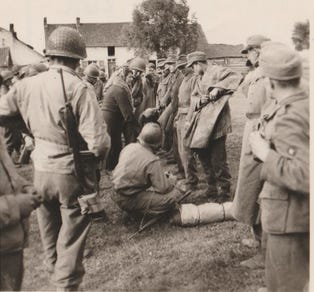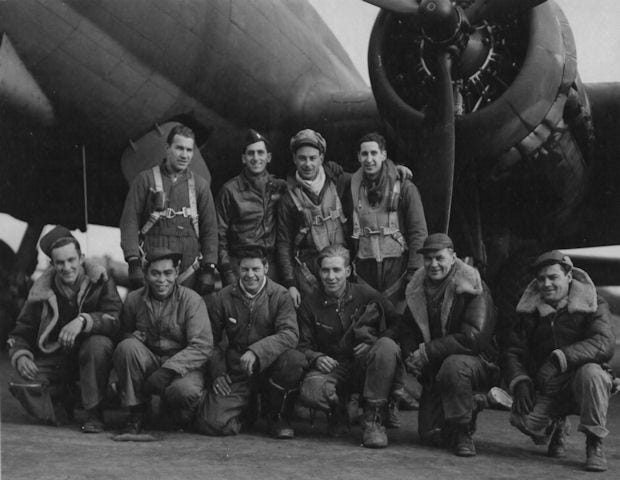Reading the paper on September 7, 1944.
Allied armies are attacking the outer defenses of the Siegfried Line, the German west wall of defense.
The Line extends for 390 miles and is comprised of thousands of bunkers, tunnels, dragon’s teeth and anti-tank ditches.
Germany had begun constructing the Line in the mid-1930s.
After the Allies’ D-Day invasion in June, Germany began upgrade efforts using forced labor, concentration camp prisoners and German teenagers.
Allied headquarters says the Siegfried Line will be broken, but it will be a difficult and costly battle.
*****
General Patton’s Third Army has crossed the Moselle River in its approach to the Siegfried Line in the face of heavy artillery fire.
Patton has begun his attack on the outskirts of Metz, a city in northeastern France occupied by German forces.
Patton’s supply lines are stretched thin and hampered by heavy rains, so, for now, the assault consists of probing attacks to uncover weak points.
The battle for Metz will begin in earnest in November.
An assault boat carrying seven American troops got stuck in debris from a cracked dam while attempting to cross the Moselle.
They were wounded and unable to help themselves.
So, an American on shore stripped down and attempted to swim to the boat with a towing rope, but the rush of water from the dam was too much for him.
But a French civilian saw the predicament, stripped down, and dove into the water, too.
He was able to reach the boat and attach the rope, allowing the Americans to tow it to safety.
No one knows why the Germans on the other side of the river, who saw all of this, did not fire their weapons.
*****
From Pfc. Ronald J. Mohski of New York City, presently serving on the banks of the Moselle:
“I sat around here the other night, listening to a radio program from back home and heard how the folks have been sitting up two nights in a row waiting for the war to be over.
“Then the next day I’m thinking about this and walking down a road and am nearly killed by a Nazi machine-gunner.
“Those folks back home might come over here and sit in this damned apple orchard.” — New York Times, September 7, 1944
*****
Meanwhile, two US reconnaissance units have become the first American troops to set foot in Germany.
There is an argument over who was actually the first man to touch German soil.
*****
US troops captured twenty-five thousand German prisoners near Mons in one of the largest prisoner hauls of the European war.
The US Office of War Information announced that 600,000 German troops have been killed, wounded or taken prisoner in Western Europe in the past three months.


And a fierce battle is raging for control of Brest, the last French city held by German forces.
German patrols near Brest have been captured wearing American uniforms.
Germans captured there have said they were told the Allied invasion force in France had been pushed back to the sea and their mission in Brest was to prevent Americans from escaping out of France.
*****
The Canadian army has trapped fifty thousand German troops in Channel ports along the North Sea.
Pamphlets have been fired by artillery and dropped from aircraft, telling the entrapped Germans the war is near an end and their death in combat would be useless.
The parents of Captain Arnold S. Litman, a B-17 pilot who was reported missing in action over Germany on August 15, have received a cable that he is ‘safely in Allied hands.’
*****
FDR is meeting with Cabinet officials to make preliminary plans for the postwar occupation of Germany.
Reports from Stockholm say that crowds of German women, soldiers and workers have staged demonstrations in several German cities shouting ‘Down with Hitler! We want peace.’
The German SS was reported to have fired into these crowds, killing civilians.
*****
Swiss travelers through Alsace and Baden report that public posters say all women, ages eighteen to fifty-five, must work for Germany’s defense, and young teenage girls must do other related work.
*****
Meanwhile, Hitler is said to have called an urgent meeting of his advisors to discuss ‘the present crisis.’
Cages in the Antwerp Zoo are now being used to temporarily detain Belgians awaiting trial on charges of collaborating with the German occupiers.
*****
American bombers attacked Japanese positions in New Guinea and Bougainville and the Japanese airfield at Iwo Jima.
Light Navy vessels patrolled New Guinea’s coastlines.
US aircraft struck Japanese positions in Burma, Thailand and China.
The US Navy reported the USS Robalo was overdue from patrol in the South China Sea and is presumed lost.
She was the twenty-eighth submarine and the 176th Navy vessel lost since the Pearl Harbor attack.
It will later be learned that the Robalo struck a Japanese mine east of Borneo on July 26.
Although the Navy reported that all eighty-one men aboard were lost, it was believed that a handful had survived the sinking but were later killed by their Japanese captors.
Among those believed to have survived the initial sinking but then been killed is the boat’s captain, a son of Rear Admiral Husband Kimmel, who commanded the US Pacific Fleet at the time of the Pearl Harbor attack.
*****
A report from Tokyo says that, as a morale boost, officials have painted British and American flags on Tokyo’s sidewalks so that civilians can walk on them.
The Soviet army has crossed the Danube River and entered Yugoslavia, joining forces with Yugoslav partisans.
Soviet forces are also approaching Warsaw.
With Germany driven back inside its borders, the lights will go on in Britain for the first time in five years.
Except for a few coastal areas, half-lighting will be permitted and homes may resume using household drapery and blinds rather than blackout curtains.
The US War Department announced demobilization plans for the Army once Germany is defeated.
Those soldiers with long service and combat records and dependent children will be given preference.
But the Navy said that its demobilization will not begin until the Japanese have been defeated.
New York Governor Thomas Dewey, the Republican nominee for president in the November election, has departed on a three-week cross-country campaign trip on a special train.
Michigan is considered a key battleground state and labor organizers hope to turn out the 500,000 immigrant war workers there for the FDR-Truman Democratic ticket.
FDR’s Republican challenger in the 1940 election, Wendell Wilkie, carried Michigan by seven thousand votes.
But FDR will carry Michigan this time, but by just one percent.


And finally, playing in movie theaters: Kismet, starring Ronald Colman and Marlene Dietrich; and Bathing Beauty, starring Esther Williams and Red Skelton.
******************************
I’ll see you on Monday.
— Brenda
























Share this post